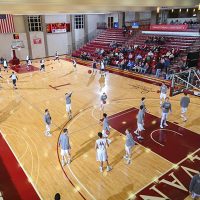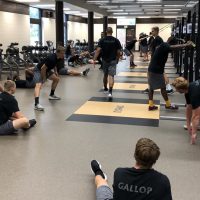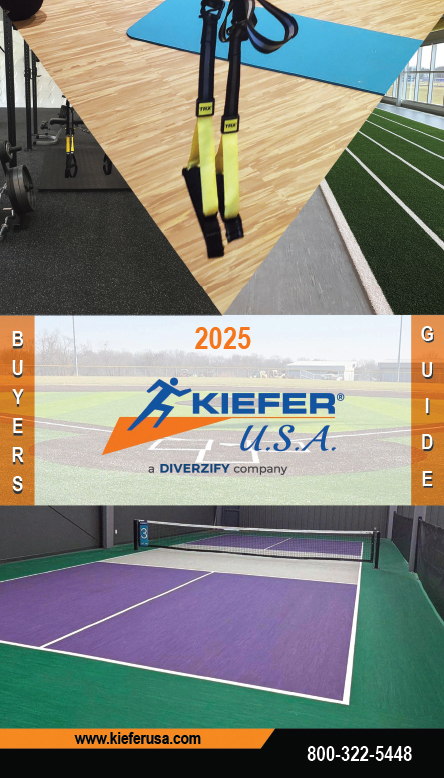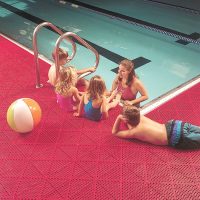
Indoor Sports Facilities: Pool and Wet Floor Maintenance Tips
Indoor pools offer respite and recreation all year around. They’re a great way to get some exercise, beat the summer heat or winter cold, relax after a stressful day, and have fun with family and friends. The inviting environment of indoor aquatic facilities attracts people from all ages and walks of life and provides them with the opportunity to boost their health, socialize with others, and enjoy their leisure time in safety and comfort, regardless of the weather conditions.
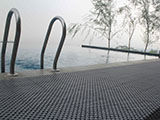 As beneficial as they may be though, indoor swimming complexes are not easy to maintain and many facility owners find the idea of operating a swimming pool quite daunting. Indoor pools do indeed require a lot of care and attention, but with proper preparation, training, and consistency maintaining a pool won’t be too much of a hassle.
As beneficial as they may be though, indoor swimming complexes are not easy to maintain and many facility owners find the idea of operating a swimming pool quite daunting. Indoor pools do indeed require a lot of care and attention, but with proper preparation, training, and consistency maintaining a pool won’t be too much of a hassle.
The secret to successful pool maintenance is regular, routine care. From shocking the water and backwashing the filter to cleaning the pool surfaces and keeping humidity levels under control, there are many things to be done to keep a pool clean and create a pleasant and healthy environment for swimmers.
Here are some essential swimming pool maintenance tips to help you take proper care of your indoor swimming facility and ensure the comfort and safety of those using the pool.
Maintain Proper Chemical Levels
Keeping pool water in proper chemical balance is critical for maintaining a safe and healthy swimming pool environment. Improperly balanced water looks murky, has a foul odor, irritates the eyes and the skin, and provides a breeding ground for bacteria.
To be able to keep the swimming water in your aquatic facility, spa center, or health club properly balanced, you need to have a thorough understanding of pool water chemistry and know how to handle the chemicals that are required for pool maintenance. It is best to obtain CPO training and certification that provides all the necessary knowledge, techniques, and skills for pool and spa operations.
Pool chemical maintenance tips:
- Maintain the correct chlorine levels, alkalinity levels, hardness levels, and pH balance according to the pool manufacturer’s recommendations;
- Make sure that there is trained staff at your facility anytime the pool is open – chemicals may have to be used unexpectedly;
- Keep accurate records of chemical levels and disinfectant measurements;
- Shock (super-chlorinate) the water once a week. Make sure you follow the manufacturer’s directions for shock treatments and provide plenty of ventilation when super-chlorinating the water in your swimming facility.
However important pool water chemical balance may be though, it is only one aspect of taking care of a pool. There are a few other important factors to consider and precautions to take as well.
Ensure Proper Pool Circulation
Good pool circulation is key to keeping the water in your pool crystal clear and healthy. The pool’s circulation system that includes the pump, the filter, and the entire network of skimmers, drains, and returns, helps chemicals work effectively and ensures that water is properly filtered.
In order to function efficiently, the circulation system has to be kept clean and free of dirt and debris:
- Clean the filter once a month – Use a chemical filter cleaner that will break up and remove dirt, then rinse the filter well. Backwash when required;
- Empty skimmer and pump baskets every time you replace the water in your pool.
Be sure to drain and replace the water of your pool on a weekly basis.
Install Proper Flooring
Swimming pool flooring and deck surfaces must be durable and safe and have to meet a number of sanitation standards. They also need to look beautiful and be easy to maintain – very important factors for keeping the pool open and the facility users happy.
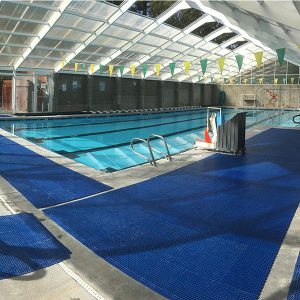 KieferUSA provides a variety of poolside flooring options that meet all these requirements – all of our swimming pool flooring products are easy to install and maintain, have comfortable, anti-slip surfaces that are friendly to bare feet but provide an excellent grip so that facility users can enjoy themselves without risk of slipping and falling, and come in a range of eye-pleasing colors that do not fade over time. The flooring material is durable, UV-stabilized, and stain-resistant. What’s more, our open grid surface floor systems allow water to drain through so it doesn’t collect and pose a risk of slipping or promote mold and mildew growth. All these factors make pool care and maintenance very easy and efficient.
KieferUSA provides a variety of poolside flooring options that meet all these requirements – all of our swimming pool flooring products are easy to install and maintain, have comfortable, anti-slip surfaces that are friendly to bare feet but provide an excellent grip so that facility users can enjoy themselves without risk of slipping and falling, and come in a range of eye-pleasing colors that do not fade over time. The flooring material is durable, UV-stabilized, and stain-resistant. What’s more, our open grid surface floor systems allow water to drain through so it doesn’t collect and pose a risk of slipping or promote mold and mildew growth. All these factors make pool care and maintenance very easy and efficient.
If you’re interested in building a pool at your indoor sports facility, contact us at 800-322-5448 for more information about ProDek wet area flooring solutions.
Clean the Pool Surfaces
The floor and walls of the pool are in constant contact with the pool water and everything in it. Keeping these surfaces in pristine condition and free of mold and slime helps keep the pool clean and safe.
So, once the water is drained, scrub the pool surfaces to remove any accumulated germs and grime:
- Use a pool brush to remove calcium deposits and dirt that has collected on the sides and bottom of the swimming pool. Select a stiff brush for plaster-lined concrete pools and a softer brush (with nylon bristles only) for vinyl and fiberglass surfaces and tiles. Brush sediments toward the main drain so they can be easily vacuumed;
- Thoroughly vacuum the interior of the pool and wipe the surfaces clean;
- Clean the pool deck – sweep, wash, and disinfect the poolside.
Ensure Proper Ventilation
No matter how clean your swimming pool is, the facility environment won’t be healthy without proper ventilation.
As already mentioned, indoor pools need to be “shocked” at least once a week – this means using large amounts of chlorine to kill bacteria in the water. As a result, chloramines and particles of grease, body oils, lotions, and perfumes are released into the air in the form of gasses. When the pool is outdoors, these gasses escape into the atmosphere. Indoors, however, they simply hit the ceiling and bounce back into the pool, compromising the air and water quality.
To avoid this problem, you need to ensure proper ventilation – install fans in your pool facility, open the windows after shocking, use low-level return vents to extract air from the water surface, etc. Investing in a quality HVAC system is also a good idea – it will not only ensure proper air flow, but will also help maintain pleasant and healthy temperature and humidity levels in the pool complex.
We hope that you will find the above information helpful to keep your swimming center in excellent condition at all times.

